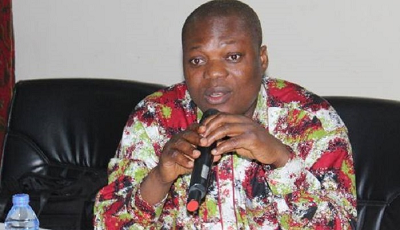
2019 Budget: A test case for govt after IMF exit - Prof. Gatsi
Jessica Acheampong
Business News
A renowned economist, Professor John Gartchie Gatsi, has said the implementation of the 2019 budget was a test case for the government to maintain a moderate and a disciplined posture in the face of gains made after the rebasing of the Gross Domestic Product (GDP) and exiting the International Monetary Fund (IMF) programme.
He said for now the onus was on the government to implement the 2019 budget, which is a post IMF exit one, with a commitment to carry through the values and lessons learnt under the IMF to ensure proper economic and monetary policy management.
Prof. Gasti, who is also the Head of the Department of Finance at the School of Business, University of Cape Coast, said “we were taught prudent and disciplined financial management, we were taught how to manage our monetary policies effectively and how to strengthen our institutions.”
Those, he said, were the things that the IMF instilled in the managers of the economy and that meant that after exiting, “Ghana is expected to carry through the same values and lessons.”
“Exiting the IMF comes with a responsibility.
The challenge is a test for the government to maintain the same level of discipline, the same level of commitment to institutional reforms, the same level of commitment to proper economic management and monetary policy management,” he said in a post-budget interview on November 16.
The 2019 budget was on the theme: “A stronger economy for jobs and prosperity” and was laid before Parliament last Thursday by the Finance Minister, Mr Ken Ofori Attah.
Right posture
He said the country had a track record of having the leeway to do things its way because it was out of the IMF programme and it was, therefore, important for the government to ensure that it remained fiscally disciplined.
“Our record is that anytime we exit the IMF programme, we feel that we are now free to do what we want to do”, he said.
He also took a swipe at the government for creating the impression that the IMF limited the government on what to spend on and the projects to undertake because it rolled out a number of interventions while under the IMF programme.
“We were under IMF when we announced ‘One district, one factory’, ‘One village, one dam’ and all those programmes. So if you could announce all those things under IMF, then what tells you it was the IMF limiting you? It wasn’t true,” he said.
Control borrowing
Prof. Gatsi explained that the rebasing of the economy could lead to an increased appetite to borrow because the debt to GDP ratio would go down and the government must ensure it does not fall into that temptation.
“We see the government is portraying the same thing, and saying that we are out of the IMF programme and our GDP has been rebased, the size of the economy has increased by 25 per cent so we are now going to do more infrastructure.
We are even planning for a century bond. It is the same posture that leads you to more borrowing,” he said.
Highlights of 2019 budget
The government has earmarked to spend a total of GH¢73.4 billion in the 2019 fiscal year.
The expenditure (including clearance of arrears) is equivalent to 21.3 per cent of gross domestic product (GDP), representing an increase of 27 per cent above the projected outturn for 2018.
The projected expenditure is, however, more than the total revenue and grants for 2019, which is estimated at GH¢58.9 billion (17.1 per cent of the rebased GDP), up from a projected outturn of GH¢46.8 billion (15.7 per cent of rebased GDP in 2018).
This implies that 2019 fiscal operations will result in an overall budget deficit of GH¢14.5 billion, equivalent to 4.2 per cent of GDP.
Budget balances and financing operations for 2019
Based on the estimates for total revenue and grants and total expenditure, financing of the fiscal deficit would be from both domestic and foreign sources.
Net foreign financing would amount to GH¢9.7 billion, including a planned sovereign bond issuance of GH¢9.6 billion, while domestic financing was estimated at GH¢4.8 billion.
This will result in a primary surplus of 1.2 per cent of GDP.
Expenditure breakdown
Expenditure on wages and salaries is forecast at GH¢19.4 billion, representing about 26.5 per cent of total expenditure.
The wage bill is anticipated to reduce to 5.6 per cent of GDP from the 5.9 per cent projected outturn for 2018.
Expenditure on goods and services was projected at GH¢6.3 billion, representing 1.8 per cent of GDP, adding: “The annual growth of 38.8 per cent reflects a full provision made to cater for the government’s priority programmes, including the flagship free SHS policy.
A total amount of GH¢18.6 billion has been estimated for interest payments on the public debt. Of this amount, domestic interest payments will constitute about 77.8 per cent and amount to GH¢14.5 billion.
The government, in 2019, will continue to implement the Earmarked Funds Capping and Realignment Act, 2017 (Act 947) to reduce budget rigidities and create fiscal space to fund growth-enhancing expenditures.
Transfer to statutory funds, as well as all other earmarked funds, were estimated at GH¢13.8 billion, equivalent to 4.0 per cent of GDP, compared to 3.5 per cent in 2018.
Capital expenditure
Capital expenditure was projected at GH¢8.5 billion, equivalent to 2.5 per cent of GDP, and a growth of 55.7 per cent over the 2018 projected outturn.
Of the amount, he said domestically financed capital expenditure was estimated at GH¢3.2 billion or 0.9 per cent of GDP, while an amount of GH¢5.3 billion had been budgeted for foreign-financed capital expenditure. — GB